Research Proposal: Talent Management Impact on Employee Retention
VerifiedAdded on 2023/01/05
|11
|3129
|74
Report
AI Summary
This research proposal investigates the critical role of talent management in employee retention and its impact on business performance, specifically within the context of the British multinational company, NISA. The study addresses the significance of talent management, which encompasses recruitment, training, performance appraisal, and compensation, in fostering employee satisfaction and reducing turnover. The research aims to explore the concept of talent management, its importance in retaining employees, the challenges NISA faces in managing talent, and recommendations for enhancing talent management practices. The literature review examines existing research on talent management, its impact on employee retention, and challenges such as high employee turnover, lack of leadership, and internal competition. The methodology outlines an interpretivism research philosophy with a descriptive research design, employing a qualitative research strategy. Data will be collected through surveys using questionnaires distributed to 50 NISA employees, and secondary data will be gathered from academic articles and journals. Thematic data analysis will be used to analyze the collected data. The proposal concludes with a time plan, and references.
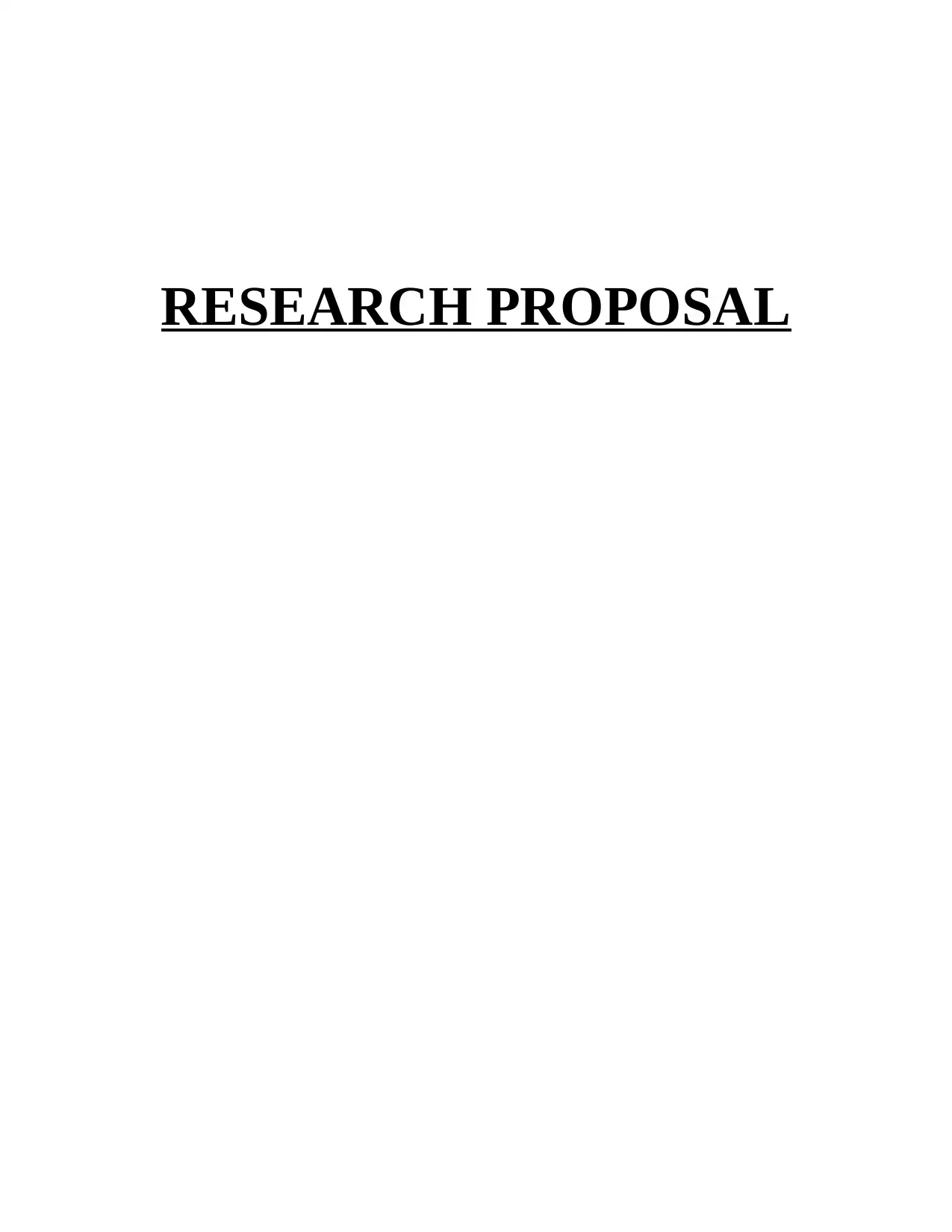
RESEARCH PROPOSAL
Paraphrase This Document
Need a fresh take? Get an instant paraphrase of this document with our AI Paraphraser
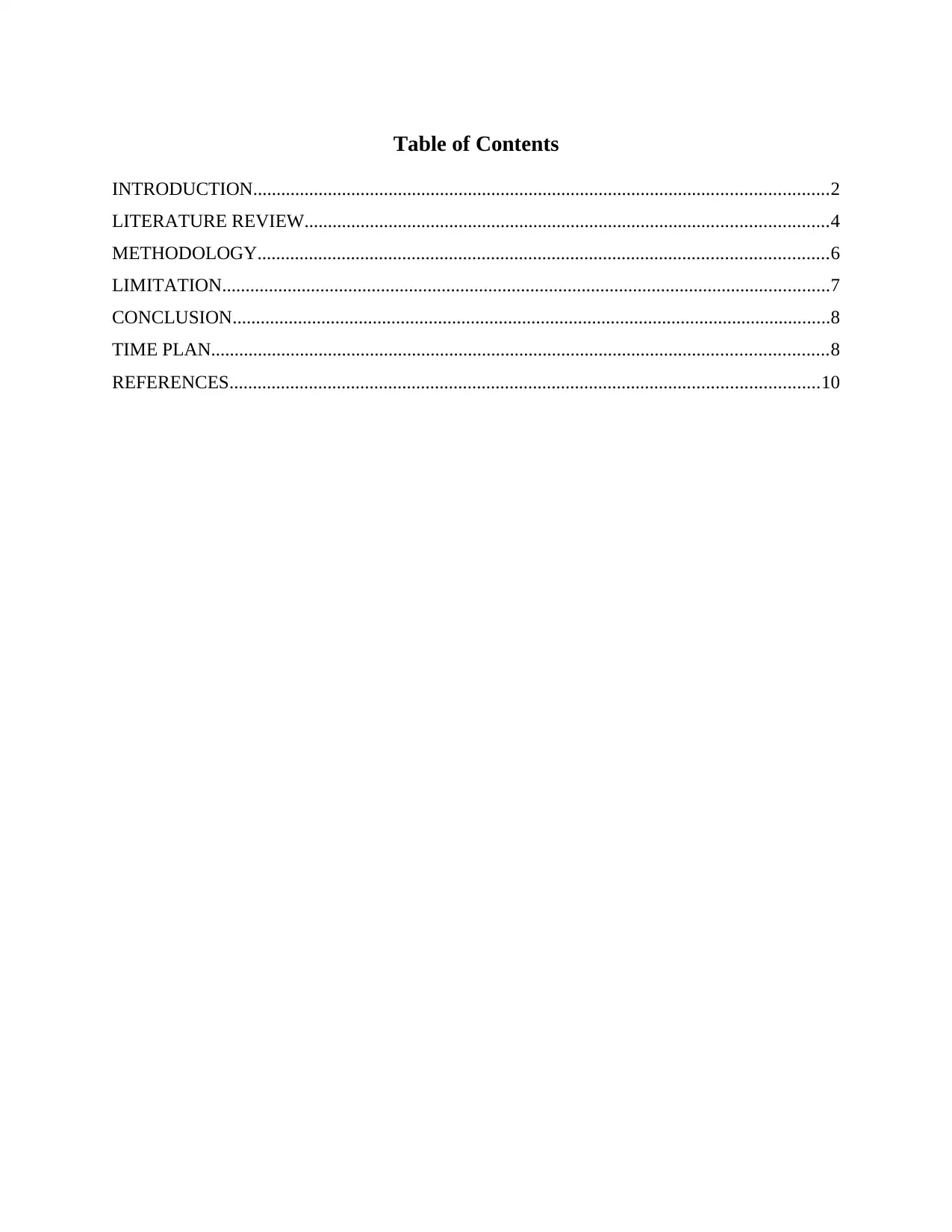
Table of Contents
INTRODUCTION...........................................................................................................................2
LITERATURE REVIEW................................................................................................................4
METHODOLOGY..........................................................................................................................6
LIMITATION..................................................................................................................................7
CONCLUSION................................................................................................................................8
TIME PLAN....................................................................................................................................8
REFERENCES..............................................................................................................................10
INTRODUCTION...........................................................................................................................2
LITERATURE REVIEW................................................................................................................4
METHODOLOGY..........................................................................................................................6
LIMITATION..................................................................................................................................7
CONCLUSION................................................................................................................................8
TIME PLAN....................................................................................................................................8
REFERENCES..............................................................................................................................10
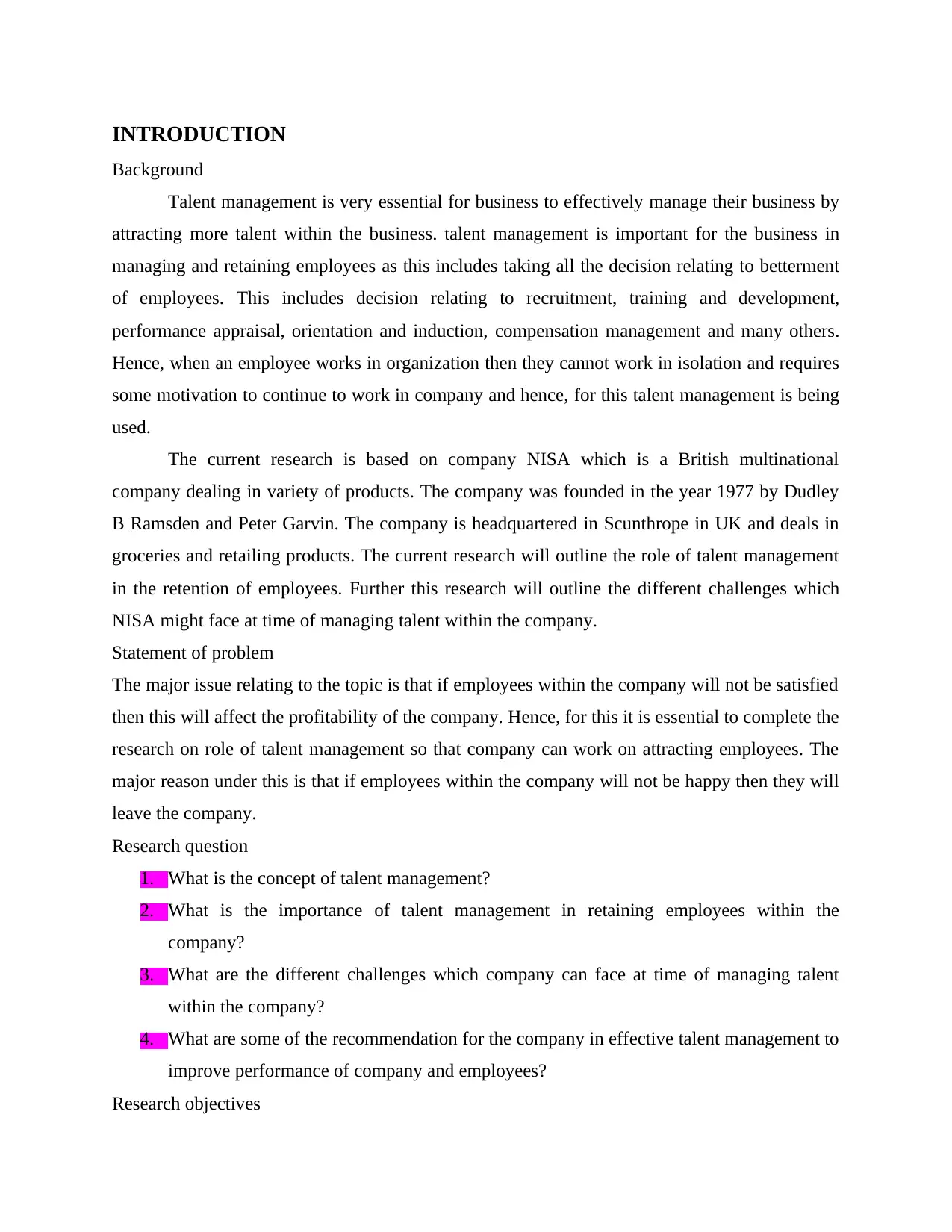
INTRODUCTION
Background
Talent management is very essential for business to effectively manage their business by
attracting more talent within the business. talent management is important for the business in
managing and retaining employees as this includes taking all the decision relating to betterment
of employees. This includes decision relating to recruitment, training and development,
performance appraisal, orientation and induction, compensation management and many others.
Hence, when an employee works in organization then they cannot work in isolation and requires
some motivation to continue to work in company and hence, for this talent management is being
used.
The current research is based on company NISA which is a British multinational
company dealing in variety of products. The company was founded in the year 1977 by Dudley
B Ramsden and Peter Garvin. The company is headquartered in Scunthrope in UK and deals in
groceries and retailing products. The current research will outline the role of talent management
in the retention of employees. Further this research will outline the different challenges which
NISA might face at time of managing talent within the company.
Statement of problem
The major issue relating to the topic is that if employees within the company will not be satisfied
then this will affect the profitability of the company. Hence, for this it is essential to complete the
research on role of talent management so that company can work on attracting employees. The
major reason under this is that if employees within the company will not be happy then they will
leave the company.
Research question
1. What is the concept of talent management?
2. What is the importance of talent management in retaining employees within the
company?
3. What are the different challenges which company can face at time of managing talent
within the company?
4. What are some of the recommendation for the company in effective talent management to
improve performance of company and employees?
Research objectives
Background
Talent management is very essential for business to effectively manage their business by
attracting more talent within the business. talent management is important for the business in
managing and retaining employees as this includes taking all the decision relating to betterment
of employees. This includes decision relating to recruitment, training and development,
performance appraisal, orientation and induction, compensation management and many others.
Hence, when an employee works in organization then they cannot work in isolation and requires
some motivation to continue to work in company and hence, for this talent management is being
used.
The current research is based on company NISA which is a British multinational
company dealing in variety of products. The company was founded in the year 1977 by Dudley
B Ramsden and Peter Garvin. The company is headquartered in Scunthrope in UK and deals in
groceries and retailing products. The current research will outline the role of talent management
in the retention of employees. Further this research will outline the different challenges which
NISA might face at time of managing talent within the company.
Statement of problem
The major issue relating to the topic is that if employees within the company will not be satisfied
then this will affect the profitability of the company. Hence, for this it is essential to complete the
research on role of talent management so that company can work on attracting employees. The
major reason under this is that if employees within the company will not be happy then they will
leave the company.
Research question
1. What is the concept of talent management?
2. What is the importance of talent management in retaining employees within the
company?
3. What are the different challenges which company can face at time of managing talent
within the company?
4. What are some of the recommendation for the company in effective talent management to
improve performance of company and employees?
Research objectives
⊘ This is a preview!⊘
Do you want full access?
Subscribe today to unlock all pages.

Trusted by 1+ million students worldwide
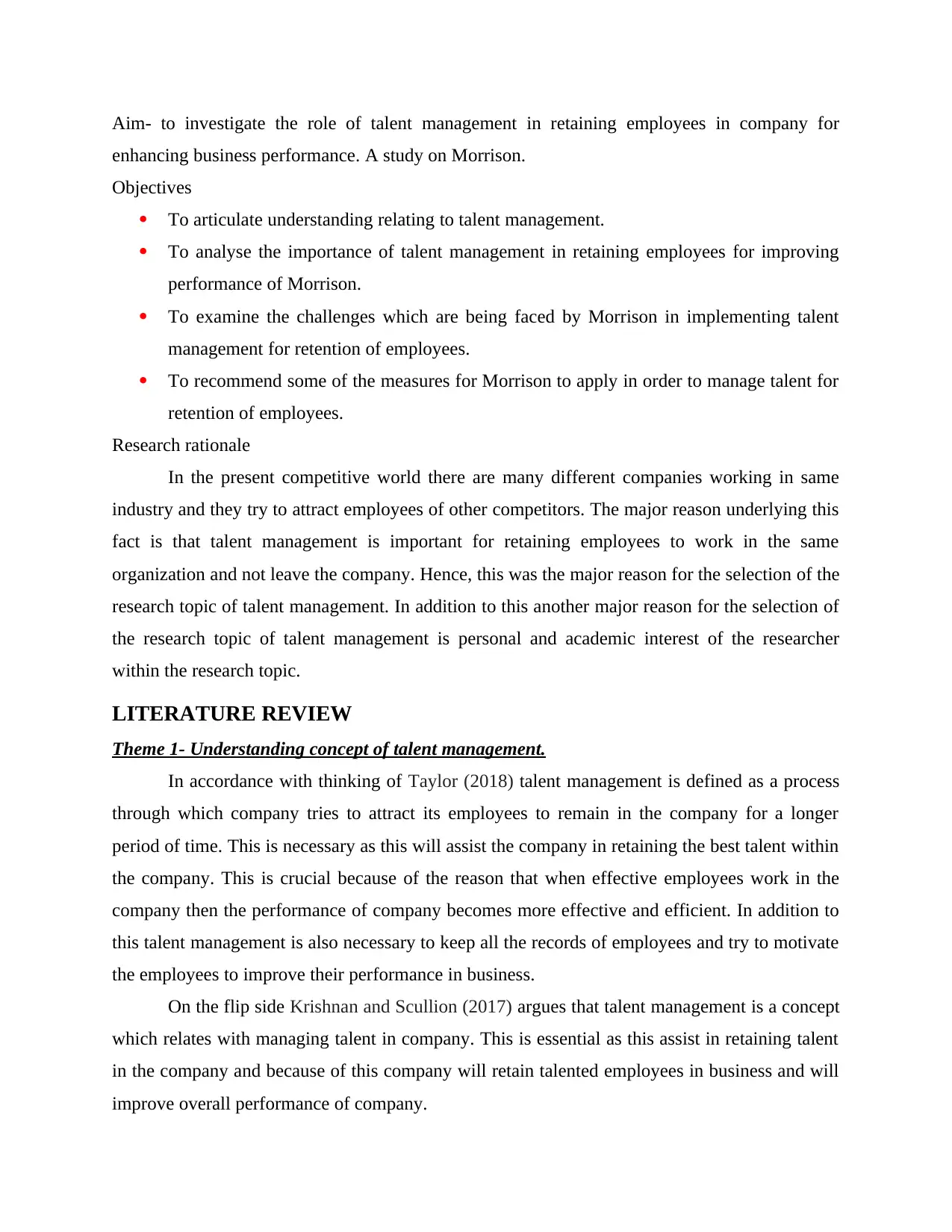
Aim- to investigate the role of talent management in retaining employees in company for
enhancing business performance. A study on Morrison.
Objectives
To articulate understanding relating to talent management.
To analyse the importance of talent management in retaining employees for improving
performance of Morrison.
To examine the challenges which are being faced by Morrison in implementing talent
management for retention of employees.
To recommend some of the measures for Morrison to apply in order to manage talent for
retention of employees.
Research rationale
In the present competitive world there are many different companies working in same
industry and they try to attract employees of other competitors. The major reason underlying this
fact is that talent management is important for retaining employees to work in the same
organization and not leave the company. Hence, this was the major reason for the selection of the
research topic of talent management. In addition to this another major reason for the selection of
the research topic of talent management is personal and academic interest of the researcher
within the research topic.
LITERATURE REVIEW
Theme 1- Understanding concept of talent management.
In accordance with thinking of Taylor (2018) talent management is defined as a process
through which company tries to attract its employees to remain in the company for a longer
period of time. This is necessary as this will assist the company in retaining the best talent within
the company. This is crucial because of the reason that when effective employees work in the
company then the performance of company becomes more effective and efficient. In addition to
this talent management is also necessary to keep all the records of employees and try to motivate
the employees to improve their performance in business.
On the flip side Krishnan and Scullion (2017) argues that talent management is a concept
which relates with managing talent in company. This is essential as this assist in retaining talent
in the company and because of this company will retain talented employees in business and will
improve overall performance of company.
enhancing business performance. A study on Morrison.
Objectives
To articulate understanding relating to talent management.
To analyse the importance of talent management in retaining employees for improving
performance of Morrison.
To examine the challenges which are being faced by Morrison in implementing talent
management for retention of employees.
To recommend some of the measures for Morrison to apply in order to manage talent for
retention of employees.
Research rationale
In the present competitive world there are many different companies working in same
industry and they try to attract employees of other competitors. The major reason underlying this
fact is that talent management is important for retaining employees to work in the same
organization and not leave the company. Hence, this was the major reason for the selection of the
research topic of talent management. In addition to this another major reason for the selection of
the research topic of talent management is personal and academic interest of the researcher
within the research topic.
LITERATURE REVIEW
Theme 1- Understanding concept of talent management.
In accordance with thinking of Taylor (2018) talent management is defined as a process
through which company tries to attract its employees to remain in the company for a longer
period of time. This is necessary as this will assist the company in retaining the best talent within
the company. This is crucial because of the reason that when effective employees work in the
company then the performance of company becomes more effective and efficient. In addition to
this talent management is also necessary to keep all the records of employees and try to motivate
the employees to improve their performance in business.
On the flip side Krishnan and Scullion (2017) argues that talent management is a concept
which relates with managing talent in company. This is essential as this assist in retaining talent
in the company and because of this company will retain talented employees in business and will
improve overall performance of company.
Paraphrase This Document
Need a fresh take? Get an instant paraphrase of this document with our AI Paraphraser
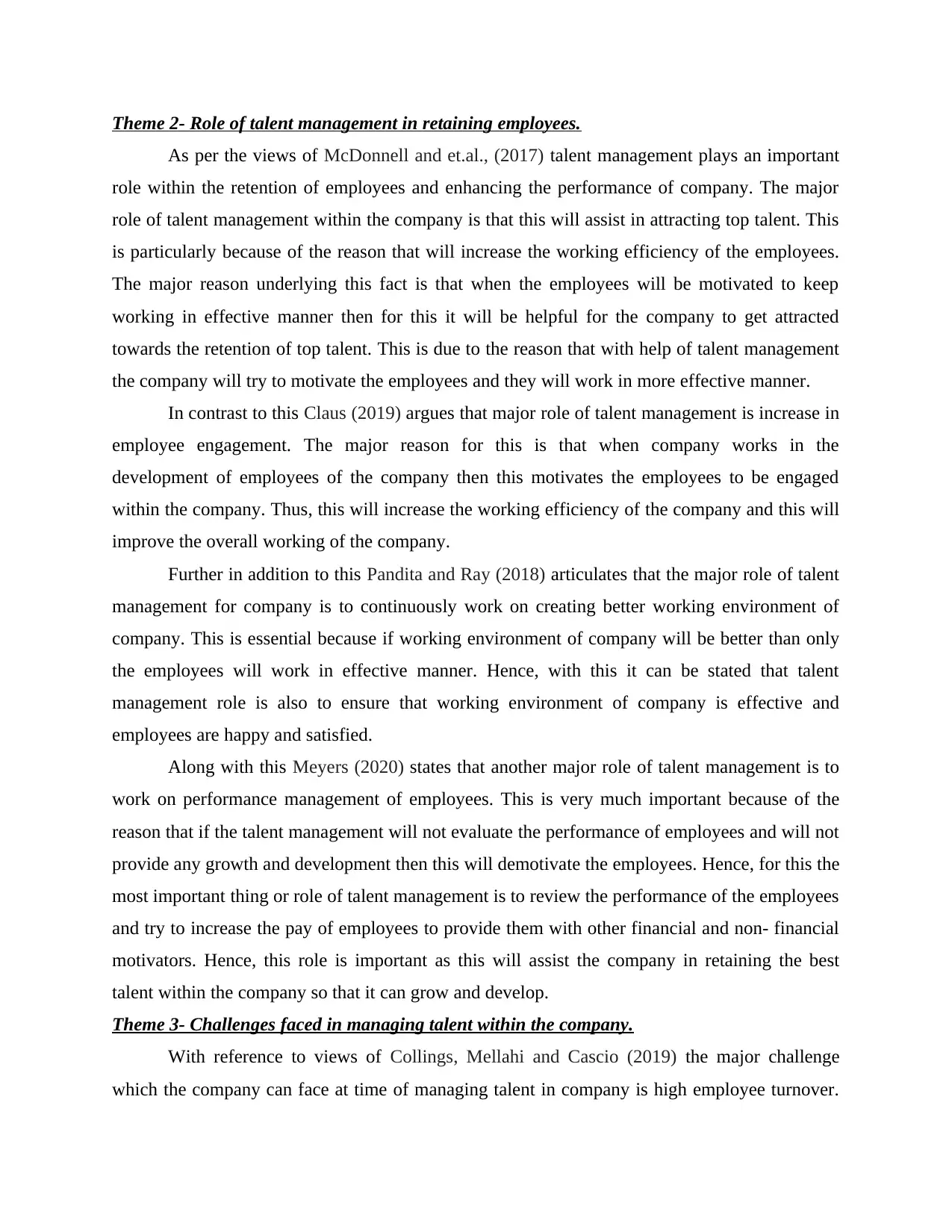
Theme 2- Role of talent management in retaining employees.
As per the views of McDonnell and et.al., (2017) talent management plays an important
role within the retention of employees and enhancing the performance of company. The major
role of talent management within the company is that this will assist in attracting top talent. This
is particularly because of the reason that will increase the working efficiency of the employees.
The major reason underlying this fact is that when the employees will be motivated to keep
working in effective manner then for this it will be helpful for the company to get attracted
towards the retention of top talent. This is due to the reason that with help of talent management
the company will try to motivate the employees and they will work in more effective manner.
In contrast to this Claus (2019) argues that major role of talent management is increase in
employee engagement. The major reason for this is that when company works in the
development of employees of the company then this motivates the employees to be engaged
within the company. Thus, this will increase the working efficiency of the company and this will
improve the overall working of the company.
Further in addition to this Pandita and Ray (2018) articulates that the major role of talent
management for company is to continuously work on creating better working environment of
company. This is essential because if working environment of company will be better than only
the employees will work in effective manner. Hence, with this it can be stated that talent
management role is also to ensure that working environment of company is effective and
employees are happy and satisfied.
Along with this Meyers (2020) states that another major role of talent management is to
work on performance management of employees. This is very much important because of the
reason that if the talent management will not evaluate the performance of employees and will not
provide any growth and development then this will demotivate the employees. Hence, for this the
most important thing or role of talent management is to review the performance of the employees
and try to increase the pay of employees to provide them with other financial and non- financial
motivators. Hence, this role is important as this will assist the company in retaining the best
talent within the company so that it can grow and develop.
Theme 3- Challenges faced in managing talent within the company.
With reference to views of Collings, Mellahi and Cascio (2019) the major challenge
which the company can face at time of managing talent in company is high employee turnover.
As per the views of McDonnell and et.al., (2017) talent management plays an important
role within the retention of employees and enhancing the performance of company. The major
role of talent management within the company is that this will assist in attracting top talent. This
is particularly because of the reason that will increase the working efficiency of the employees.
The major reason underlying this fact is that when the employees will be motivated to keep
working in effective manner then for this it will be helpful for the company to get attracted
towards the retention of top talent. This is due to the reason that with help of talent management
the company will try to motivate the employees and they will work in more effective manner.
In contrast to this Claus (2019) argues that major role of talent management is increase in
employee engagement. The major reason for this is that when company works in the
development of employees of the company then this motivates the employees to be engaged
within the company. Thus, this will increase the working efficiency of the company and this will
improve the overall working of the company.
Further in addition to this Pandita and Ray (2018) articulates that the major role of talent
management for company is to continuously work on creating better working environment of
company. This is essential because if working environment of company will be better than only
the employees will work in effective manner. Hence, with this it can be stated that talent
management role is also to ensure that working environment of company is effective and
employees are happy and satisfied.
Along with this Meyers (2020) states that another major role of talent management is to
work on performance management of employees. This is very much important because of the
reason that if the talent management will not evaluate the performance of employees and will not
provide any growth and development then this will demotivate the employees. Hence, for this the
most important thing or role of talent management is to review the performance of the employees
and try to increase the pay of employees to provide them with other financial and non- financial
motivators. Hence, this role is important as this will assist the company in retaining the best
talent within the company so that it can grow and develop.
Theme 3- Challenges faced in managing talent within the company.
With reference to views of Collings, Mellahi and Cascio (2019) the major challenge
which the company can face at time of managing talent in company is high employee turnover.
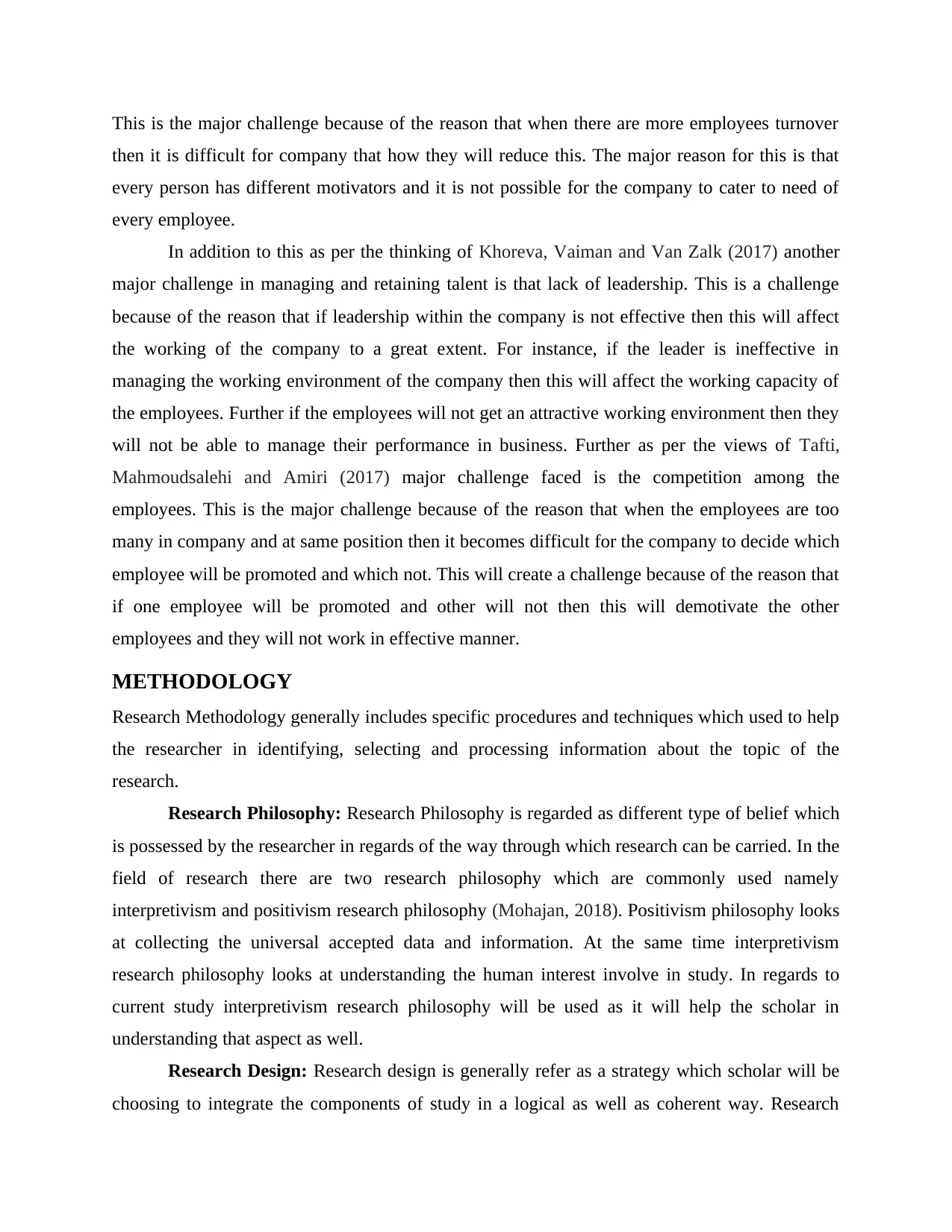
This is the major challenge because of the reason that when there are more employees turnover
then it is difficult for company that how they will reduce this. The major reason for this is that
every person has different motivators and it is not possible for the company to cater to need of
every employee.
In addition to this as per the thinking of Khoreva, Vaiman and Van Zalk (2017) another
major challenge in managing and retaining talent is that lack of leadership. This is a challenge
because of the reason that if leadership within the company is not effective then this will affect
the working of the company to a great extent. For instance, if the leader is ineffective in
managing the working environment of the company then this will affect the working capacity of
the employees. Further if the employees will not get an attractive working environment then they
will not be able to manage their performance in business. Further as per the views of Tafti,
Mahmoudsalehi and Amiri (2017) major challenge faced is the competition among the
employees. This is the major challenge because of the reason that when the employees are too
many in company and at same position then it becomes difficult for the company to decide which
employee will be promoted and which not. This will create a challenge because of the reason that
if one employee will be promoted and other will not then this will demotivate the other
employees and they will not work in effective manner.
METHODOLOGY
Research Methodology generally includes specific procedures and techniques which used to help
the researcher in identifying, selecting and processing information about the topic of the
research.
Research Philosophy: Research Philosophy is regarded as different type of belief which
is possessed by the researcher in regards of the way through which research can be carried. In the
field of research there are two research philosophy which are commonly used namely
interpretivism and positivism research philosophy (Mohajan, 2018). Positivism philosophy looks
at collecting the universal accepted data and information. At the same time interpretivism
research philosophy looks at understanding the human interest involve in study. In regards to
current study interpretivism research philosophy will be used as it will help the scholar in
understanding that aspect as well.
Research Design: Research design is generally refer as a strategy which scholar will be
choosing to integrate the components of study in a logical as well as coherent way. Research
then it is difficult for company that how they will reduce this. The major reason for this is that
every person has different motivators and it is not possible for the company to cater to need of
every employee.
In addition to this as per the thinking of Khoreva, Vaiman and Van Zalk (2017) another
major challenge in managing and retaining talent is that lack of leadership. This is a challenge
because of the reason that if leadership within the company is not effective then this will affect
the working of the company to a great extent. For instance, if the leader is ineffective in
managing the working environment of the company then this will affect the working capacity of
the employees. Further if the employees will not get an attractive working environment then they
will not be able to manage their performance in business. Further as per the views of Tafti,
Mahmoudsalehi and Amiri (2017) major challenge faced is the competition among the
employees. This is the major challenge because of the reason that when the employees are too
many in company and at same position then it becomes difficult for the company to decide which
employee will be promoted and which not. This will create a challenge because of the reason that
if one employee will be promoted and other will not then this will demotivate the other
employees and they will not work in effective manner.
METHODOLOGY
Research Methodology generally includes specific procedures and techniques which used to help
the researcher in identifying, selecting and processing information about the topic of the
research.
Research Philosophy: Research Philosophy is regarded as different type of belief which
is possessed by the researcher in regards of the way through which research can be carried. In the
field of research there are two research philosophy which are commonly used namely
interpretivism and positivism research philosophy (Mohajan, 2018). Positivism philosophy looks
at collecting the universal accepted data and information. At the same time interpretivism
research philosophy looks at understanding the human interest involve in study. In regards to
current study interpretivism research philosophy will be used as it will help the scholar in
understanding that aspect as well.
Research Design: Research design is generally refer as a strategy which scholar will be
choosing to integrate the components of study in a logical as well as coherent way. Research
⊘ This is a preview!⊘
Do you want full access?
Subscribe today to unlock all pages.

Trusted by 1+ million students worldwide
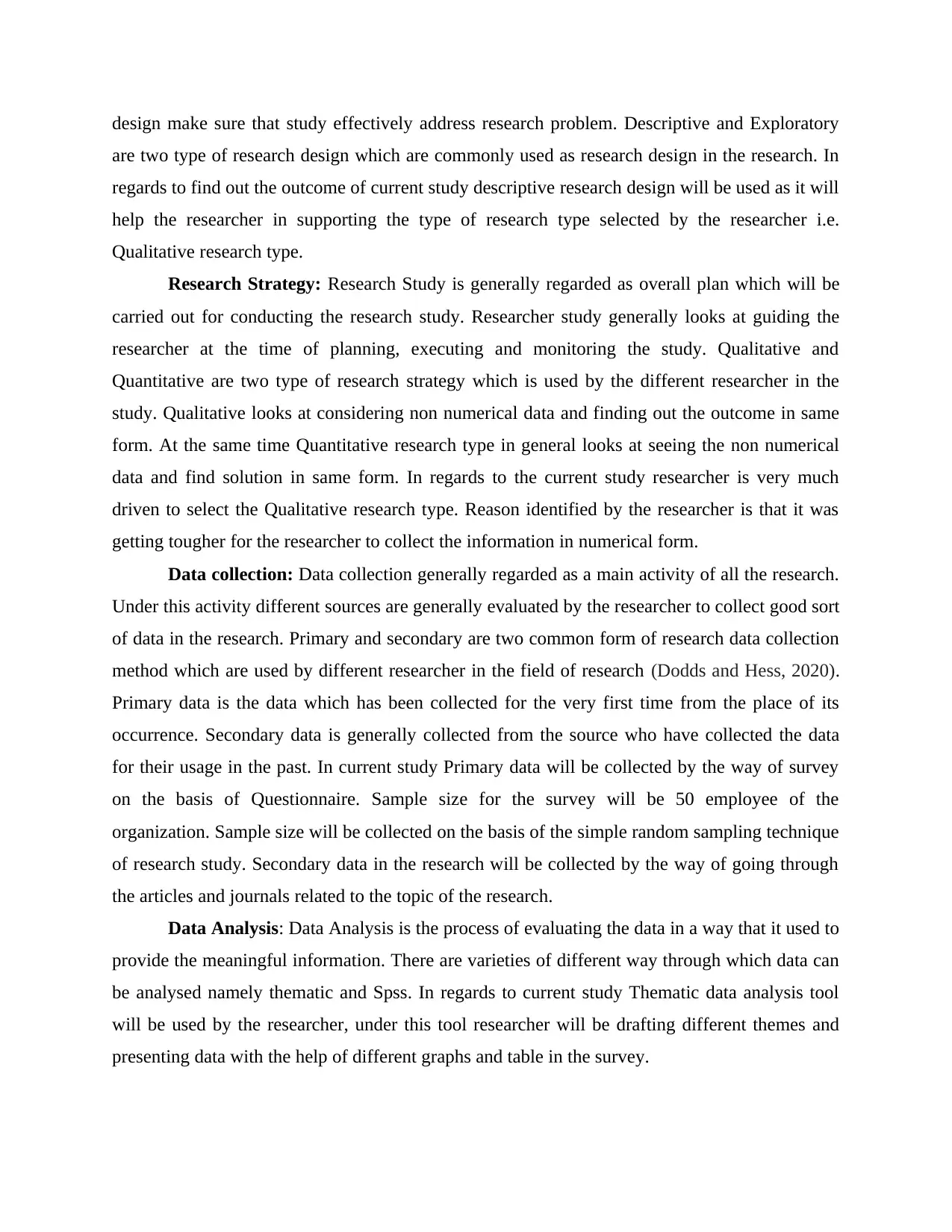
design make sure that study effectively address research problem. Descriptive and Exploratory
are two type of research design which are commonly used as research design in the research. In
regards to find out the outcome of current study descriptive research design will be used as it will
help the researcher in supporting the type of research type selected by the researcher i.e.
Qualitative research type.
Research Strategy: Research Study is generally regarded as overall plan which will be
carried out for conducting the research study. Researcher study generally looks at guiding the
researcher at the time of planning, executing and monitoring the study. Qualitative and
Quantitative are two type of research strategy which is used by the different researcher in the
study. Qualitative looks at considering non numerical data and finding out the outcome in same
form. At the same time Quantitative research type in general looks at seeing the non numerical
data and find solution in same form. In regards to the current study researcher is very much
driven to select the Qualitative research type. Reason identified by the researcher is that it was
getting tougher for the researcher to collect the information in numerical form.
Data collection: Data collection generally regarded as a main activity of all the research.
Under this activity different sources are generally evaluated by the researcher to collect good sort
of data in the research. Primary and secondary are two common form of research data collection
method which are used by different researcher in the field of research (Dodds and Hess, 2020).
Primary data is the data which has been collected for the very first time from the place of its
occurrence. Secondary data is generally collected from the source who have collected the data
for their usage in the past. In current study Primary data will be collected by the way of survey
on the basis of Questionnaire. Sample size for the survey will be 50 employee of the
organization. Sample size will be collected on the basis of the simple random sampling technique
of research study. Secondary data in the research will be collected by the way of going through
the articles and journals related to the topic of the research.
Data Analysis: Data Analysis is the process of evaluating the data in a way that it used to
provide the meaningful information. There are varieties of different way through which data can
be analysed namely thematic and Spss. In regards to current study Thematic data analysis tool
will be used by the researcher, under this tool researcher will be drafting different themes and
presenting data with the help of different graphs and table in the survey.
are two type of research design which are commonly used as research design in the research. In
regards to find out the outcome of current study descriptive research design will be used as it will
help the researcher in supporting the type of research type selected by the researcher i.e.
Qualitative research type.
Research Strategy: Research Study is generally regarded as overall plan which will be
carried out for conducting the research study. Researcher study generally looks at guiding the
researcher at the time of planning, executing and monitoring the study. Qualitative and
Quantitative are two type of research strategy which is used by the different researcher in the
study. Qualitative looks at considering non numerical data and finding out the outcome in same
form. At the same time Quantitative research type in general looks at seeing the non numerical
data and find solution in same form. In regards to the current study researcher is very much
driven to select the Qualitative research type. Reason identified by the researcher is that it was
getting tougher for the researcher to collect the information in numerical form.
Data collection: Data collection generally regarded as a main activity of all the research.
Under this activity different sources are generally evaluated by the researcher to collect good sort
of data in the research. Primary and secondary are two common form of research data collection
method which are used by different researcher in the field of research (Dodds and Hess, 2020).
Primary data is the data which has been collected for the very first time from the place of its
occurrence. Secondary data is generally collected from the source who have collected the data
for their usage in the past. In current study Primary data will be collected by the way of survey
on the basis of Questionnaire. Sample size for the survey will be 50 employee of the
organization. Sample size will be collected on the basis of the simple random sampling technique
of research study. Secondary data in the research will be collected by the way of going through
the articles and journals related to the topic of the research.
Data Analysis: Data Analysis is the process of evaluating the data in a way that it used to
provide the meaningful information. There are varieties of different way through which data can
be analysed namely thematic and Spss. In regards to current study Thematic data analysis tool
will be used by the researcher, under this tool researcher will be drafting different themes and
presenting data with the help of different graphs and table in the survey.
Paraphrase This Document
Need a fresh take? Get an instant paraphrase of this document with our AI Paraphraser
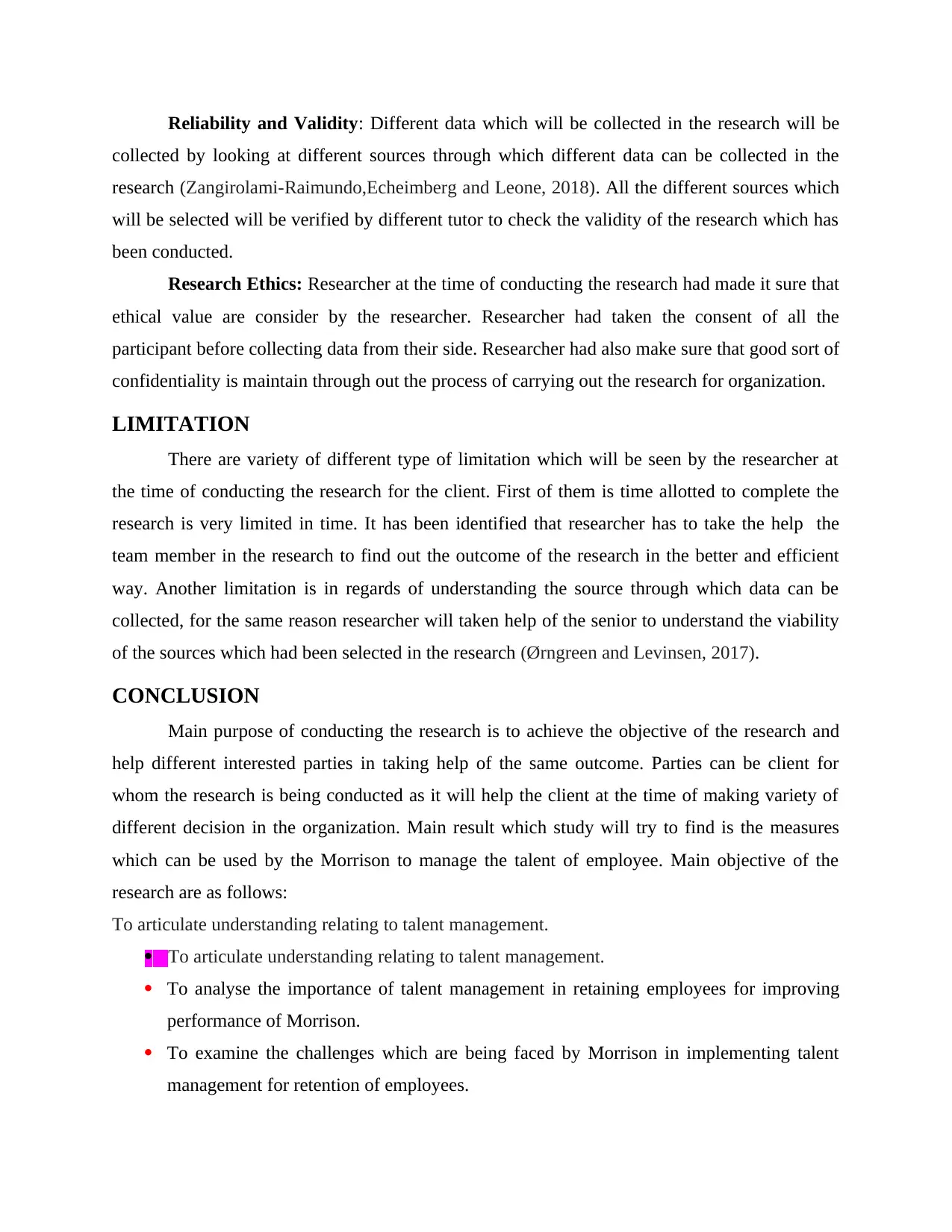
Reliability and Validity: Different data which will be collected in the research will be
collected by looking at different sources through which different data can be collected in the
research (Zangirolami-Raimundo,Echeimberg and Leone, 2018). All the different sources which
will be selected will be verified by different tutor to check the validity of the research which has
been conducted.
Research Ethics: Researcher at the time of conducting the research had made it sure that
ethical value are consider by the researcher. Researcher had taken the consent of all the
participant before collecting data from their side. Researcher had also make sure that good sort of
confidentiality is maintain through out the process of carrying out the research for organization.
LIMITATION
There are variety of different type of limitation which will be seen by the researcher at
the time of conducting the research for the client. First of them is time allotted to complete the
research is very limited in time. It has been identified that researcher has to take the help the
team member in the research to find out the outcome of the research in the better and efficient
way. Another limitation is in regards of understanding the source through which data can be
collected, for the same reason researcher will taken help of the senior to understand the viability
of the sources which had been selected in the research (Ørngreen and Levinsen, 2017).
CONCLUSION
Main purpose of conducting the research is to achieve the objective of the research and
help different interested parties in taking help of the same outcome. Parties can be client for
whom the research is being conducted as it will help the client at the time of making variety of
different decision in the organization. Main result which study will try to find is the measures
which can be used by the Morrison to manage the talent of employee. Main objective of the
research are as follows:
To articulate understanding relating to talent management.
To articulate understanding relating to talent management.
To analyse the importance of talent management in retaining employees for improving
performance of Morrison.
To examine the challenges which are being faced by Morrison in implementing talent
management for retention of employees.
collected by looking at different sources through which different data can be collected in the
research (Zangirolami-Raimundo,Echeimberg and Leone, 2018). All the different sources which
will be selected will be verified by different tutor to check the validity of the research which has
been conducted.
Research Ethics: Researcher at the time of conducting the research had made it sure that
ethical value are consider by the researcher. Researcher had taken the consent of all the
participant before collecting data from their side. Researcher had also make sure that good sort of
confidentiality is maintain through out the process of carrying out the research for organization.
LIMITATION
There are variety of different type of limitation which will be seen by the researcher at
the time of conducting the research for the client. First of them is time allotted to complete the
research is very limited in time. It has been identified that researcher has to take the help the
team member in the research to find out the outcome of the research in the better and efficient
way. Another limitation is in regards of understanding the source through which data can be
collected, for the same reason researcher will taken help of the senior to understand the viability
of the sources which had been selected in the research (Ørngreen and Levinsen, 2017).
CONCLUSION
Main purpose of conducting the research is to achieve the objective of the research and
help different interested parties in taking help of the same outcome. Parties can be client for
whom the research is being conducted as it will help the client at the time of making variety of
different decision in the organization. Main result which study will try to find is the measures
which can be used by the Morrison to manage the talent of employee. Main objective of the
research are as follows:
To articulate understanding relating to talent management.
To articulate understanding relating to talent management.
To analyse the importance of talent management in retaining employees for improving
performance of Morrison.
To examine the challenges which are being faced by Morrison in implementing talent
management for retention of employees.
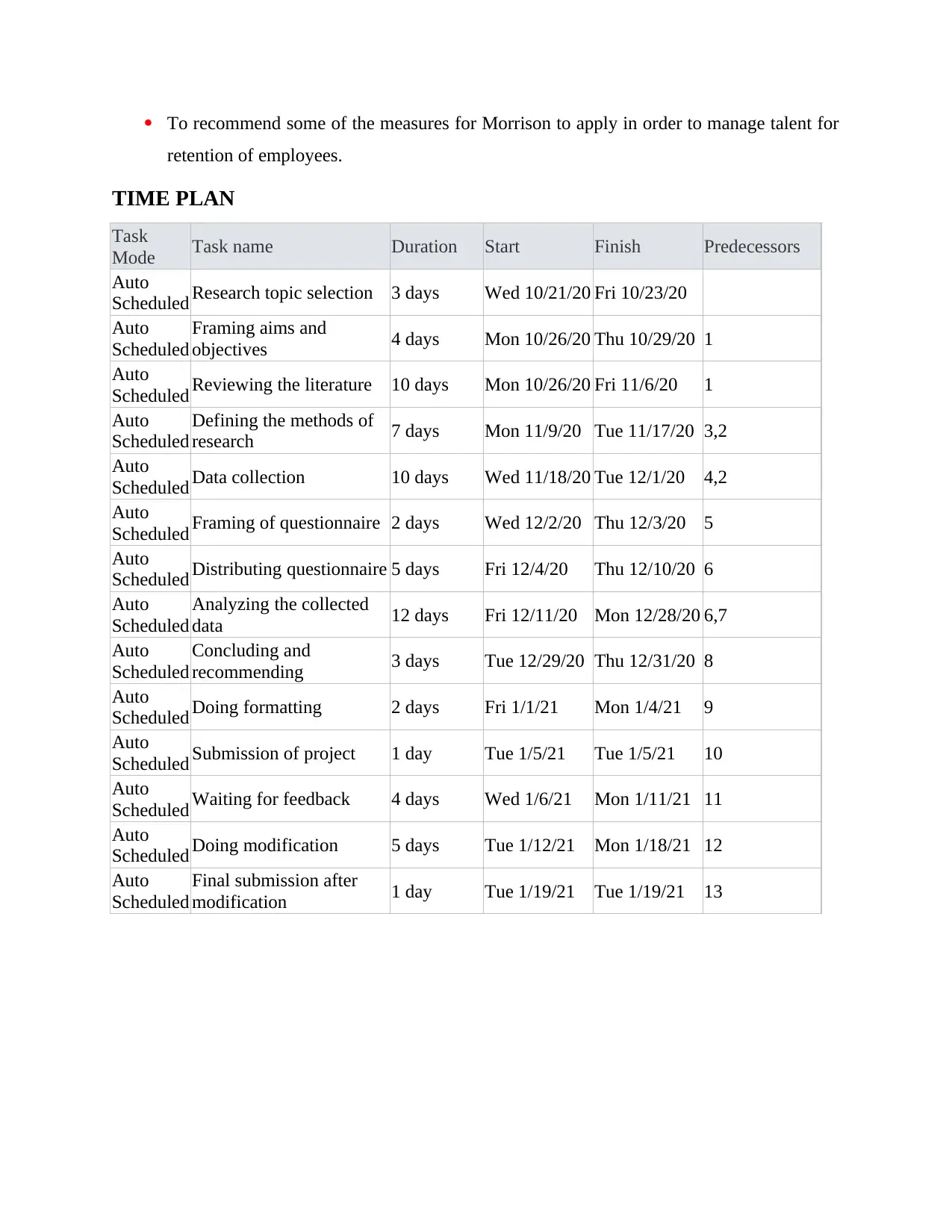
To recommend some of the measures for Morrison to apply in order to manage talent for
retention of employees.
TIME PLAN
Task
Mode Task name Duration Start Finish Predecessors
Auto
Scheduled Research topic selection 3 days Wed 10/21/20 Fri 10/23/20
Auto
Scheduled
Framing aims and
objectives 4 days Mon 10/26/20 Thu 10/29/20 1
Auto
Scheduled Reviewing the literature 10 days Mon 10/26/20 Fri 11/6/20 1
Auto
Scheduled
Defining the methods of
research 7 days Mon 11/9/20 Tue 11/17/20 3,2
Auto
Scheduled Data collection 10 days Wed 11/18/20 Tue 12/1/20 4,2
Auto
Scheduled Framing of questionnaire 2 days Wed 12/2/20 Thu 12/3/20 5
Auto
Scheduled Distributing questionnaire 5 days Fri 12/4/20 Thu 12/10/20 6
Auto
Scheduled
Analyzing the collected
data 12 days Fri 12/11/20 Mon 12/28/20 6,7
Auto
Scheduled
Concluding and
recommending 3 days Tue 12/29/20 Thu 12/31/20 8
Auto
Scheduled Doing formatting 2 days Fri 1/1/21 Mon 1/4/21 9
Auto
Scheduled Submission of project 1 day Tue 1/5/21 Tue 1/5/21 10
Auto
Scheduled Waiting for feedback 4 days Wed 1/6/21 Mon 1/11/21 11
Auto
Scheduled Doing modification 5 days Tue 1/12/21 Mon 1/18/21 12
Auto
Scheduled
Final submission after
modification 1 day Tue 1/19/21 Tue 1/19/21 13
retention of employees.
TIME PLAN
Task
Mode Task name Duration Start Finish Predecessors
Auto
Scheduled Research topic selection 3 days Wed 10/21/20 Fri 10/23/20
Auto
Scheduled
Framing aims and
objectives 4 days Mon 10/26/20 Thu 10/29/20 1
Auto
Scheduled Reviewing the literature 10 days Mon 10/26/20 Fri 11/6/20 1
Auto
Scheduled
Defining the methods of
research 7 days Mon 11/9/20 Tue 11/17/20 3,2
Auto
Scheduled Data collection 10 days Wed 11/18/20 Tue 12/1/20 4,2
Auto
Scheduled Framing of questionnaire 2 days Wed 12/2/20 Thu 12/3/20 5
Auto
Scheduled Distributing questionnaire 5 days Fri 12/4/20 Thu 12/10/20 6
Auto
Scheduled
Analyzing the collected
data 12 days Fri 12/11/20 Mon 12/28/20 6,7
Auto
Scheduled
Concluding and
recommending 3 days Tue 12/29/20 Thu 12/31/20 8
Auto
Scheduled Doing formatting 2 days Fri 1/1/21 Mon 1/4/21 9
Auto
Scheduled Submission of project 1 day Tue 1/5/21 Tue 1/5/21 10
Auto
Scheduled Waiting for feedback 4 days Wed 1/6/21 Mon 1/11/21 11
Auto
Scheduled Doing modification 5 days Tue 1/12/21 Mon 1/18/21 12
Auto
Scheduled
Final submission after
modification 1 day Tue 1/19/21 Tue 1/19/21 13
⊘ This is a preview!⊘
Do you want full access?
Subscribe today to unlock all pages.

Trusted by 1+ million students worldwide
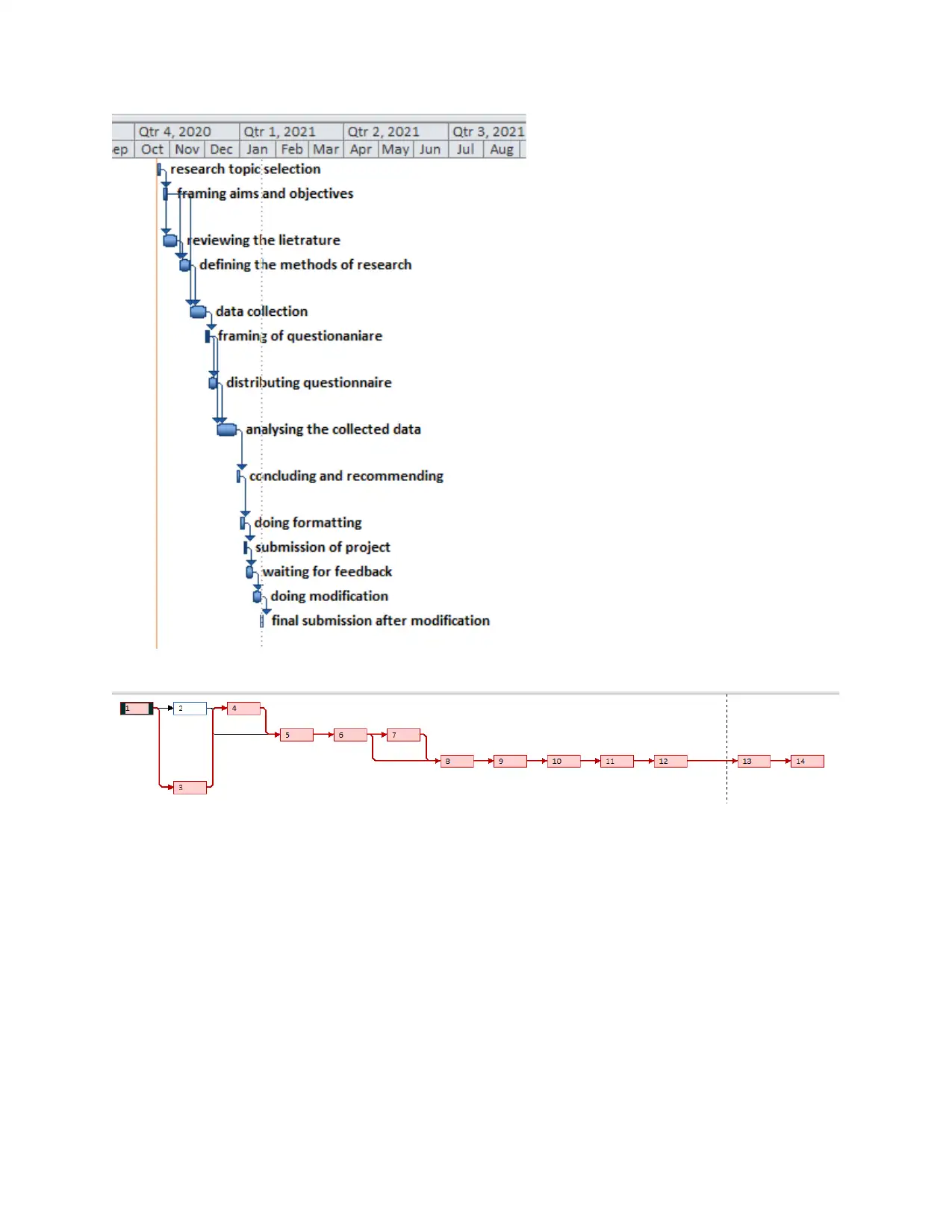
Paraphrase This Document
Need a fresh take? Get an instant paraphrase of this document with our AI Paraphraser
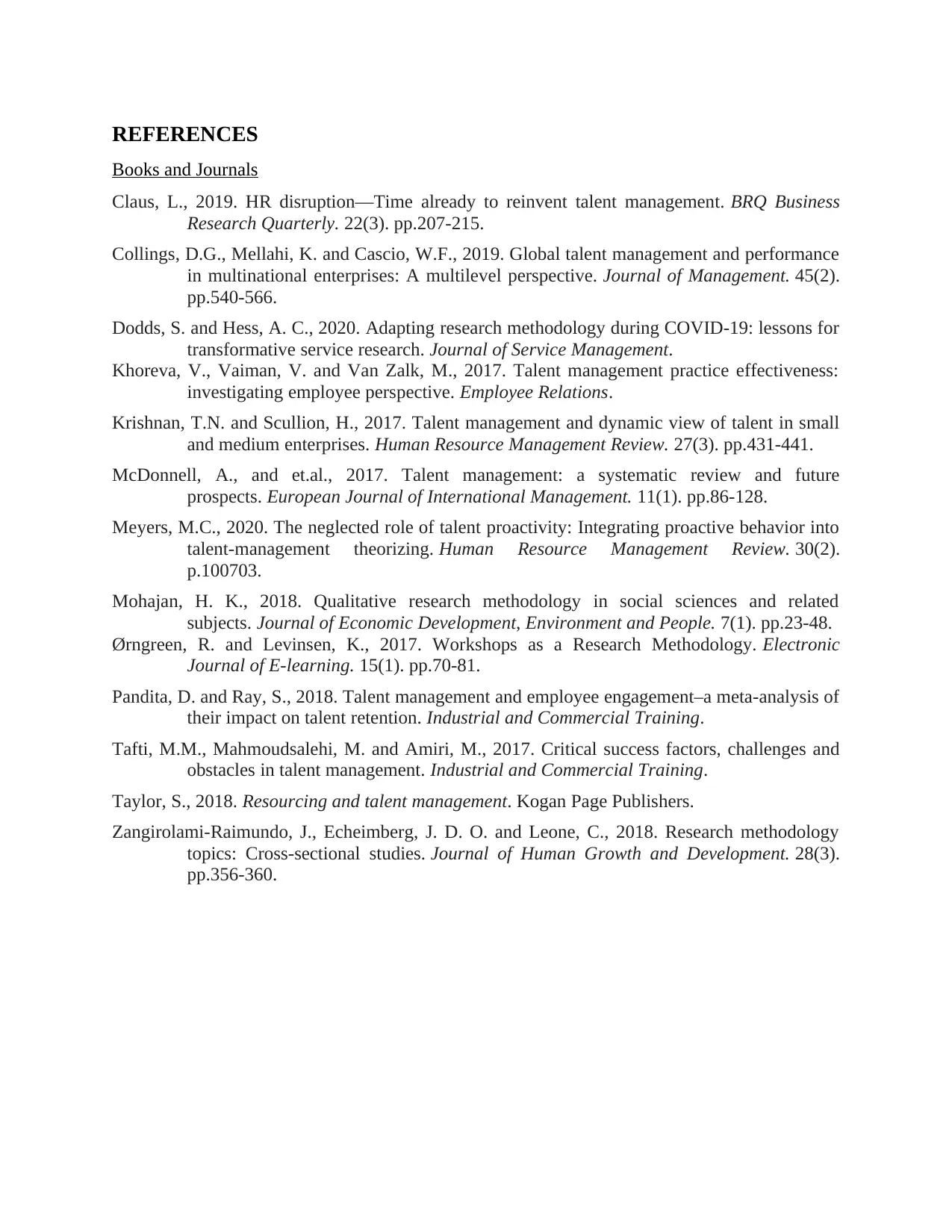
REFERENCES
Books and Journals
Claus, L., 2019. HR disruption—Time already to reinvent talent management. BRQ Business
Research Quarterly. 22(3). pp.207-215.
Collings, D.G., Mellahi, K. and Cascio, W.F., 2019. Global talent management and performance
in multinational enterprises: A multilevel perspective. Journal of Management. 45(2).
pp.540-566.
Dodds, S. and Hess, A. C., 2020. Adapting research methodology during COVID-19: lessons for
transformative service research. Journal of Service Management.
Khoreva, V., Vaiman, V. and Van Zalk, M., 2017. Talent management practice effectiveness:
investigating employee perspective. Employee Relations.
Krishnan, T.N. and Scullion, H., 2017. Talent management and dynamic view of talent in small
and medium enterprises. Human Resource Management Review. 27(3). pp.431-441.
McDonnell, A., and et.al., 2017. Talent management: a systematic review and future
prospects. European Journal of International Management. 11(1). pp.86-128.
Meyers, M.C., 2020. The neglected role of talent proactivity: Integrating proactive behavior into
talent-management theorizing. Human Resource Management Review. 30(2).
p.100703.
Mohajan, H. K., 2018. Qualitative research methodology in social sciences and related
subjects. Journal of Economic Development, Environment and People. 7(1). pp.23-48.
Ørngreen, R. and Levinsen, K., 2017. Workshops as a Research Methodology. Electronic
Journal of E-learning. 15(1). pp.70-81.
Pandita, D. and Ray, S., 2018. Talent management and employee engagement–a meta-analysis of
their impact on talent retention. Industrial and Commercial Training.
Tafti, M.M., Mahmoudsalehi, M. and Amiri, M., 2017. Critical success factors, challenges and
obstacles in talent management. Industrial and Commercial Training.
Taylor, S., 2018. Resourcing and talent management. Kogan Page Publishers.
Zangirolami-Raimundo, J., Echeimberg, J. D. O. and Leone, C., 2018. Research methodology
topics: Cross-sectional studies. Journal of Human Growth and Development. 28(3).
pp.356-360.
Books and Journals
Claus, L., 2019. HR disruption—Time already to reinvent talent management. BRQ Business
Research Quarterly. 22(3). pp.207-215.
Collings, D.G., Mellahi, K. and Cascio, W.F., 2019. Global talent management and performance
in multinational enterprises: A multilevel perspective. Journal of Management. 45(2).
pp.540-566.
Dodds, S. and Hess, A. C., 2020. Adapting research methodology during COVID-19: lessons for
transformative service research. Journal of Service Management.
Khoreva, V., Vaiman, V. and Van Zalk, M., 2017. Talent management practice effectiveness:
investigating employee perspective. Employee Relations.
Krishnan, T.N. and Scullion, H., 2017. Talent management and dynamic view of talent in small
and medium enterprises. Human Resource Management Review. 27(3). pp.431-441.
McDonnell, A., and et.al., 2017. Talent management: a systematic review and future
prospects. European Journal of International Management. 11(1). pp.86-128.
Meyers, M.C., 2020. The neglected role of talent proactivity: Integrating proactive behavior into
talent-management theorizing. Human Resource Management Review. 30(2).
p.100703.
Mohajan, H. K., 2018. Qualitative research methodology in social sciences and related
subjects. Journal of Economic Development, Environment and People. 7(1). pp.23-48.
Ørngreen, R. and Levinsen, K., 2017. Workshops as a Research Methodology. Electronic
Journal of E-learning. 15(1). pp.70-81.
Pandita, D. and Ray, S., 2018. Talent management and employee engagement–a meta-analysis of
their impact on talent retention. Industrial and Commercial Training.
Tafti, M.M., Mahmoudsalehi, M. and Amiri, M., 2017. Critical success factors, challenges and
obstacles in talent management. Industrial and Commercial Training.
Taylor, S., 2018. Resourcing and talent management. Kogan Page Publishers.
Zangirolami-Raimundo, J., Echeimberg, J. D. O. and Leone, C., 2018. Research methodology
topics: Cross-sectional studies. Journal of Human Growth and Development. 28(3).
pp.356-360.
1 out of 11
Related Documents
Your All-in-One AI-Powered Toolkit for Academic Success.
+13062052269
info@desklib.com
Available 24*7 on WhatsApp / Email
![[object Object]](/_next/static/media/star-bottom.7253800d.svg)
Unlock your academic potential
Copyright © 2020–2026 A2Z Services. All Rights Reserved. Developed and managed by ZUCOL.





